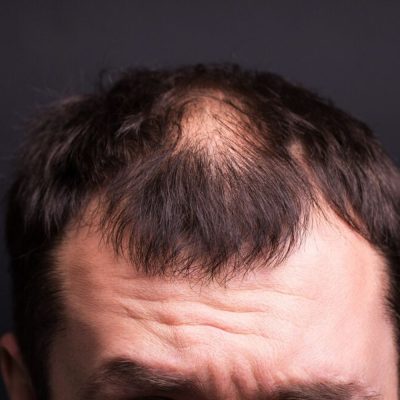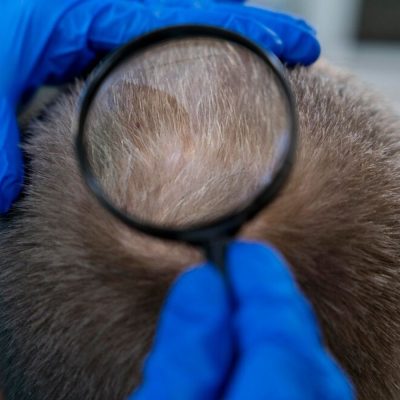Alopecia Areata
Alopecia areata is an autoimmune condition leading to sudden hair loss in patches. It can be a distressing condition that not only affects the scalp but also other hair-bearing areas of the body. At SkinAccess Clinics, we provide comprehensive care for individuals suffering from alopecia areata, offering advanced treatments and personalized support to help you manage your condition effectively.

What is Alopecia Areata?
Alopecia areata is a type of hair loss that occurs when the body’s immune system mistakenly attacks hair follicles, leading to hair loss in small, round patches. While it primarily affects the scalp, it can also impact other areas like the eyebrows, eyelashes and beard. The extent of hair loss varies from individual to individual. At times, the condition can progress to:
o Alopecia Totalis: Complete loss of scalp hair
o Alopecia Universalis: Complete loss of body hair
Symptoms of Alopecia Areata
The primary symptom of alopecia areata is hair loss. Some other key symptoms include
Patchy Hair Loss
Round or oval patches of hair loss on the scalp or other areas of the body.
Smooth, Bare Patches
Affected areas are typically smooth and may be slightly red or have a tingling sensation.
Nail Changes
At times, individuals may experience pitting, ridging or brittleness of their nails.
Regrowth & Recurrence
Hair may regrow in the affected areas; however, it may fall out again, leading to a cycle of hair loss and regrowth.
Causes of Alopecia Areata
The exact cause of alopecia areata is not fully understood, but it is believed to involve a combination of genetic and environmental factors
The immune system mistakenly targets hair follicles, disrupting hair growth and causing hair to fall out.
Individuals with a family history of autoimmune diseases are at a higher risk of developing the condition.
Stress, viral infections or other such factors can trigger or exacerbate the condition.

Diagnosis of Alopecia Areata
A proper diagnosis of alopecia areata by a qualified dermatologist involves
Clinical Examination
A physical examination of the affected areas is conducted to assess the extent and pattern of hair loss.
Trichoscopy
A dermascope is used for a detailed examination of the scalp and hair to identify characteristic signs of alopecia areata.
Medical History
A family history of autoimmune diseases or any recent stressors is ascertained, which aids in arriving at a diagnosis.
Biopsy
At times, a skin biopsy may be needed to confirm the diagnosis and rule out other causes of hair loss.
Management and Treatment of Alopecia Areata
Currently, there is no cure for alopecia areata, however, there are various options to help manage the condition and promote hair regrowth. At SkinAccess Clinics, we offer a range of treatment options to best suit your specific needs.
➥ Topical Treatments: There are various creams, serums and ointments that may be prescribed that help in various ways. Some reduce inflammation and suppress the immune response, others stimulate hair regrowth and some may be applied on the skin to alter immune function and promote hair regrowth. The best combination is determined by a qualified dermatologist depending on your specific needs.
➥ Oral Medications: Oral medications may be prescribed in extensive or severe cases. They are primarily used to suppress the immune system, reduce inflammation and reduce hair loss.
➥ Injections: Injecting corticosteroids directly into the affected areas can help stimulate hair regrowth. This is particularly helpful in small patches of hair loss.
➥ Light & Laser Therapy:
- Phototherapy: Ultraviolet (UV) light therapy may be used to modulate the immune response and promote hair regrowth.
- Laser Therapy: Excimer laser therapy can help facilitate hair regrowth by stimulating hair follicles.
➥ Behavioural & Lifestyle Modifications: Stress can be a triggering factor for alopecia areata, hence, minimizing stress can help in the management of the condition. Also, it is important to maintain a balanced diet rich in minerals and vitamins that support hair health.
➥ Supportive Care: Emotional support and counselling can be helpful for individuals who have a significant psychological impact due to the condition.
Conclusion
Alopecia areata can have a significant impact on an individual’s mind and quality of life. However, with the right care, it is possible to manage the symptoms and promote hair regrowth. At SkinAccess Clinics, we are committed to providing compassionate care and support to you through your journey with us. We provide individualized care plans that best suit your condition and its requirements. If you or a loved one is experiencing hair loss, schedule a consultation with us today to explore the best options for managing alopecia areata!
